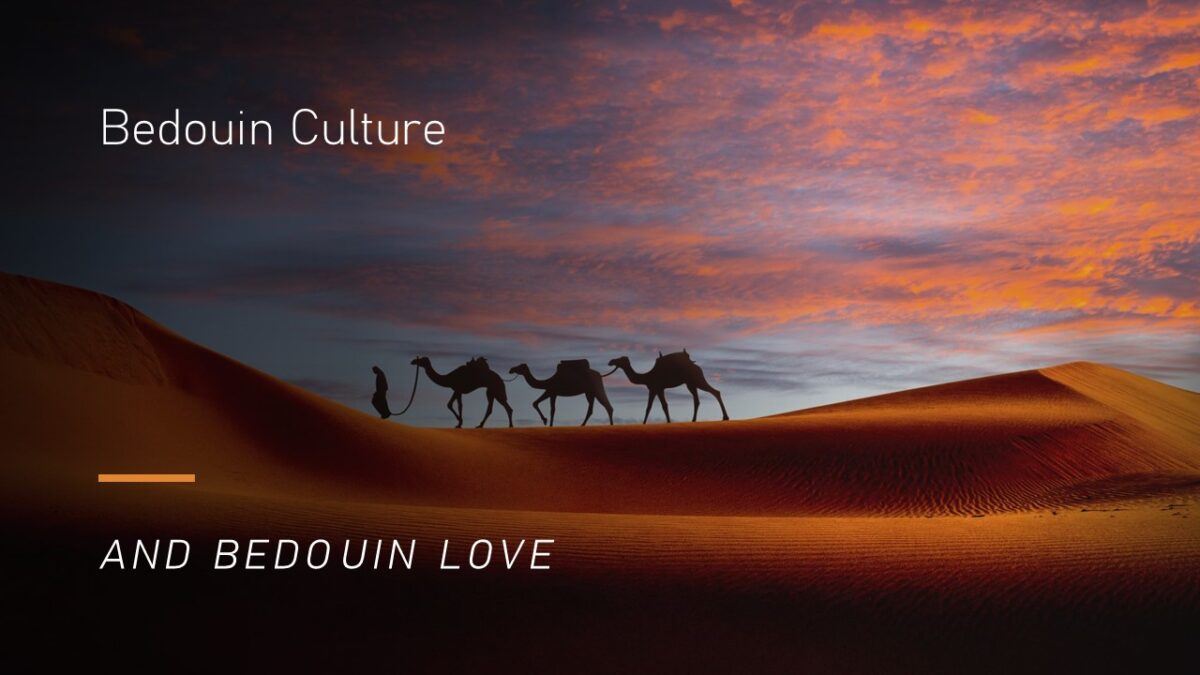Bedouin culture is the culture of the nomadic Arab people who live in Arabia, the territory that stretches from the deserts of North Africa to the rocky sands of the Middle East. Living in tribes, they have a common culture of herding camels and goats. Most Bedouins follow Islam, but there are also a small number of Christian Bedouins. In Arabic, they are known as the ʾAʿrāb (أعراب).
One example of such a society is that of the Bedouins in the Western Desert of Egypt. Another example is the Arab-Palestinian people in southern Israel. Some Bedouins still follow their traditional culture, living in clan structures. The others, however, have acquired a modern urban lifestyle, abandoning their nomadic and tribal traditions.
In another article, I talked more about “Bedouin Culture.”
Two Realms of Love in Bedouin Culture
In Bedouin societies, love exists in two realms: real and ideal (Karandashev, 2017). The traditional Bedouin culture is a patriarchal society, keeping boys and girls, men and women, segregated. The moral discourse comprising modesty and honor has a high value. Cultural norms discourage autonomy and individual choice in relationships. As in many other traditional South Asian cultures, kinship, family honor, and social hierarchy are valued more than individual emotions and preferences. Therefore, both men and women usually feel uncomfortable in intimate relationships (Abu-Lughod, 1986/2016).
The Ideology of Gender Inequality in Bedouin Culture
Bedouin cultural ideologies declare gender inequality and social hierarchy. Individuals have the freedom to make choices about their lives. However, the value of autonomy is normally associated with masculinity. The cultural value of autonomy is for men, while the cultural value of dependency is for women. In Bedouin communities, patriarchal control over women is still existent and prevalent (Aburabia 2011, 2017; Kook, Harel-Shalev, and Yuval 2019).
The traditional extended family—the hamula (clan)—continues to maintain high authority and control over women’s lives. Every woman can choose what she wants, but she must know the limit (Aburabia, 2011; Daoud et al., 2020; Harel-Shalev, Kook, & Elkrenawe, 2020, p. 493).
An extended family puts limitations on and also keeps control over men’s lives, yet men are allowed to have more autonomy and freedom. For instance, the practice of polygyny is still common among the Bedouin community, even though it is legally forbidden. The approximate rates of polygamy are 20–30%. In some villages, it could be 60% (Aburabia, 2011).
Cultural Dreams of Romantic Love in Bedouin Culture
On the other hand, stories, poems, and songs in modern Bedouin culture cherish romantic love as a high value. It is worth noting that passion seems more valuable than intimacy. Love is bound by controversial emotions. Poems of love may express an individual’s strength, autonomy, mastery of passions, and support of the values of honor and modesty. On the other hand, the poetry of love expresses attachment, vulnerability, loss, and bitterness related to the state of “being in love.” Romantic poetry is valued, relishing a declared freedom from social domination. It conveys subversive messages. Thus, despite the patriarchal and segregated society in which Bedouins live, their stories, poems, and songs of romantic love cherish the imaginations of people in modern Bedouin culture. Romantic poems, songs, and stories about love offer important expressions of deeply held human emotions and desires that are considered unacceptable and disturbing by the dominant culture (Orsini, 2006, pp. 22–23).
The amorous feelings expressed in poems and the seeming rigidity of modesty in daily communications are evidently at odds with each other in modern Bedouin culture. Does it mean that these poetic sentiments illuminate the more authentic selves of men and women? Not necessarily.
Ideal and Real Love in Bedouin Culture
The romantic, poetic expression of love is not always evidence of a person’s more genuine self. The psychological interactions between the social hierarchy of power, the moral sentiment of modesty and submissive reverence, and the poetic discourse of love are far more complex than just defying authority. These cultural experiences cannot be reduced to such straight interpretations and cannot be simply contrasted with Western understandings.
The structure of Bedouin love is more tangled than Western scholars tend to interpret it. Poems, songs, and romantic stories enrich men’s and women’s cultural understanding of emotions, but do not refuse or rebel against the reality of the love life. Their selves rearrange priorities and integrate other people and social obligations into their extended “collectivistic self.” Their freedom of choice integrates with social affordances and communal responsibility. Such perspectives on love appear to contrast with European American individualistic culture, which emphasizes an individual’s freedom of choice while minimizing responsibility for the choices individuals make. (Abu-Lughod, 1986/2016).
